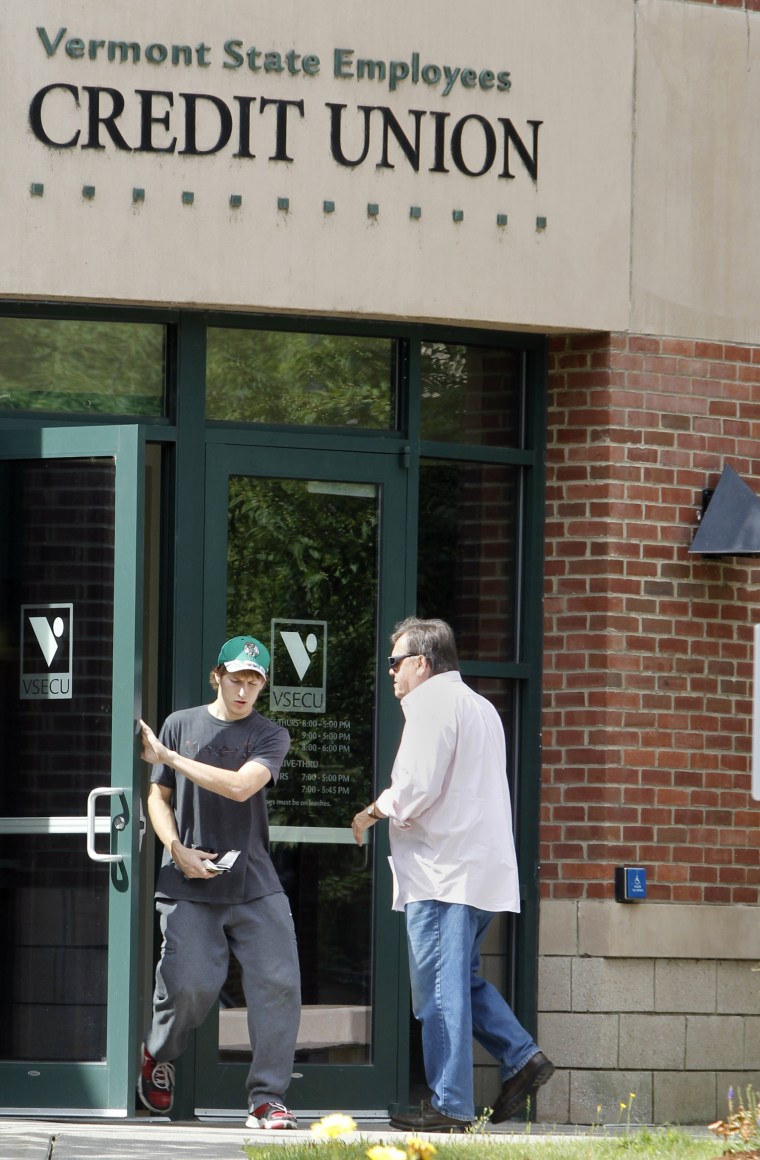Shopping for a new loan, or a savings or checking account? You have more options than you think. Banks are the main place people park their money or get their loans, but credit unions are growing in popularity as consumers thumb their noses at credit unions' big brother in the world of financial institutions.
According to a March 2012 survey of 5,000 consumers conducted by Pleasanton, Calif., market research firm Javelin Strategy & Research, 11 percent of respondents indicated they would switch their main financial institution during the year. For the first quarter of 2012, membership increased by 667,000, reports the National Association of Federal Credit Unions, an Arlington, Va., trade association.
Although credit unions are an alternative to banks, a decision to switch depends on what you want from your financial institution. For some consumers, low rates on loans and higher rates on savings accounts are all that matters. For others, it's all about convenience or accessibility.
Bankrate.com: U.S. to get world's cheapest car
"Banks may offer a better opportunity if you need a more sophisticated lending product or investment product," said Gene Kirsch, senior financial analyst at Weiss Ratings, a ratings firm in Jupiter, Fla. "For everything else, you're best to shop around. Credit unions are very competitive."
One of the major differences between a bank and credit union is its corporate structure. Banks are for-profit institutions, which means they are in the business to make money, and they have shareholders to placate. Credit unions are nonprofit and are owned by the members of the credit union, which means their focus is on serving the members.
Banks are conflicted because they have to manage what's best for the customers with what's in the best interest of shareholders, said Alix Patterson, chief operating officer at Washington, D.C., research firm Callahan & Associates Inc.
Bankrate.com: New rules to receive unemployment
"Banks are designed to maximize shareholder value, which leads to different decisions than credit unions," she said.
In the past, the corporate makeup of a credit union or bank wouldn't matter to a consumer who simply wants the best rates, but that has changed in recent months. Fed up with the fees and seemingly bad behavior on the part of banks, consumers pulled money out of banks and into credit unions on Nov. 5, 2011, a date that has become known as "bank transfer day."
That one day demonstrated that consumers do care about more than simply rates, said Mark Schwanhausser, Javelin director of multichannel financial services.
Bankrate.com: $100K income: No big deal anymore
To join a credit union, you have to be part of a specific group, whether group members work for a certain employer, live in a particular town, or belong to a church or organization. On the other hand, banks are open to anyone.
"Anyone can walk in off the street and join a bank, but as far as a credit union you have to have some common bond to belong," Kirsch said.
Because you have to have some affiliation with the credit union, it means you may not be able to join the one you want. But it doesn't mean you can't become a customer of a credit union, as credit unions increasingly become region-specific rather than group-specific.
"Not everybody can join any credit union, but there's a credit union for everybody," said Patrick Keefe, a spokesman for the Washington, D.C., and Madison, Wis.-based Credit Union National Association.
Most credit unions charge a one-time membership fee to join, which runs from $5 to $20, Keefe said. Banks don't charge a one-time monthly service fee, but some require a minimum amount to open an account.
For people who care solely about savings, checking and loan rates, a credit union may make the most sense. On average, credit unions do better on those rates than banks do.
Bankrate.com: 11 celebs who served in the military
"Credit unions can offer higher deposit rates and lower interest rates on loans than banks because they don't have to worry about profits," Kirsch said. "Profits at credit unions are plowed back in and returned to members in the form of dividend payments, lower fees or lower interest rates."
Still, while credit unions typically beat banks on rates, it's only on the advertised rates, said Keith Leggett, vice president and senior economist at Washington, D.C.-based trade association American Bankers Association. "Banks are willing to beat the credit union, but you do need to go in and ask," Leggett said.
Because the rates can vary from bank to bank and credit union to credit union, banking experts say it pays to shop around if the best rate is what you are after. Bankrate's comparison rate tool lets you check current rates at credit unions and banks on banking products across the country.
One of the knocks against credit unions is the lack of convenience. While some banks seem to have a branch on every corner, credit unions typically only have one or two branches. At the end of the day, the convenience and accessibility are what truly matter, said Schwanhausser.
On bank transfer day, credit unions succeeded in gaining new members, but many consumers didn't unplug from the giant banks altogether, Schwanhausser said. For many people, switching means changing their direct deposit, canceling their bill pay and giving up access to branches pretty much wherever they are.
"The main reason is consumers are looking for convenience. Yes, fees do matter, but they are not mad enough to switch," he said.
That's not to say credit unions aren't trying to catch up. While you'll never see a credit union branch on every street corner of a major city, there is a network of 24,000 ATMs across the country, and credit unions are starting to set up shop in places frequented by consumers, such as supermarkets or convenience stores.
"Credit unions deal with accessibility with shared networks and technology," Patterson said.
